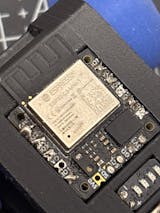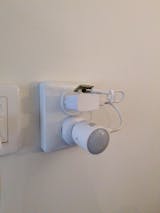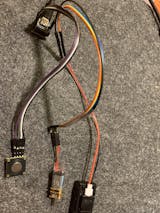The CodeCell C3 is a compact module measuring just 1.85 cm in width. It features an Arduino-compatible ESP32-C3 microcontroller that provides Wi-Fi and BLE connectivity, battery charging management, light/proximity sensing, and a 9-axis IMU motion sensor.
It offers 6 programmable GPIO pins, along with I2C pins, plus multiple power pins for connecting additional modules, sensors, and actuators.
The CodeCell C3 can be powered either through a safe-to-use LiPo battery connector or via USB-C, which also supports reprogramming, serial data transfer, and battery charging. Its power management is built around the BQ24232 battery management chip, enabling dynamic power-path control. This allows the battery to charge while the system continues operating.

The CodeCell includes a VCNL4040 light sensor and a BNO085 9-axis IMU motion sensor with onboard sensor-fusion algorithms. The VCNL4040 is an IR-based sensor capable of measuring ambient light and proximity up to 20 cm. For more advanced projects, the BNO085 provides 9-axis sensing by combining a 3-axis accelerometer, 3-axis gyroscope, and 3-axis magnetometer. Using sensor-fusion, it delivers detailed motion data such as angular orientation (roll, pitch, yaw), motion state, activity classification, linear acceleration, tap detection, and even step counts. These capabilities make the CodeCell especially suited for robotics and wearable applications.
To make working with the sensors easier, the CodeCell.h Arduino library provides simple, ready-to-use functions along with tutorials and example projects. The CodeCell can also connect to our free app, allowing you to easily add wireless controls to your projects with sliders, buttons, a joystick, real-time sensor feedback, and a 20-character display – perfect for debugging!
Each box includes the CodeCell, a set of four M1.2 screws, and three sets of female headers (soldering optional). A 1.25 mm pitch battery cable is also provided, along with the optional 170 mAh 20C LiPo battery. The optional battery measures 23 × 17.5 × 8.7 mm, weighs 4.6 g, and comes pre-wired with a 1.25 mm female connector that plugs directly into the onboard connector. See the full battery datasheet here. Schematics for this module are available here.
This module uses the ESP32-C3-MINI-1-N4, which is certified for FCC, CE, TELEC, and Wi-Fi Alliance compliance. The CodeCell is also RoHS compliant and follows the IPC-A-600 II standard.
Please note that the CodeCell is intended as a DIY maker kit. For commercial use, please contact us.























































